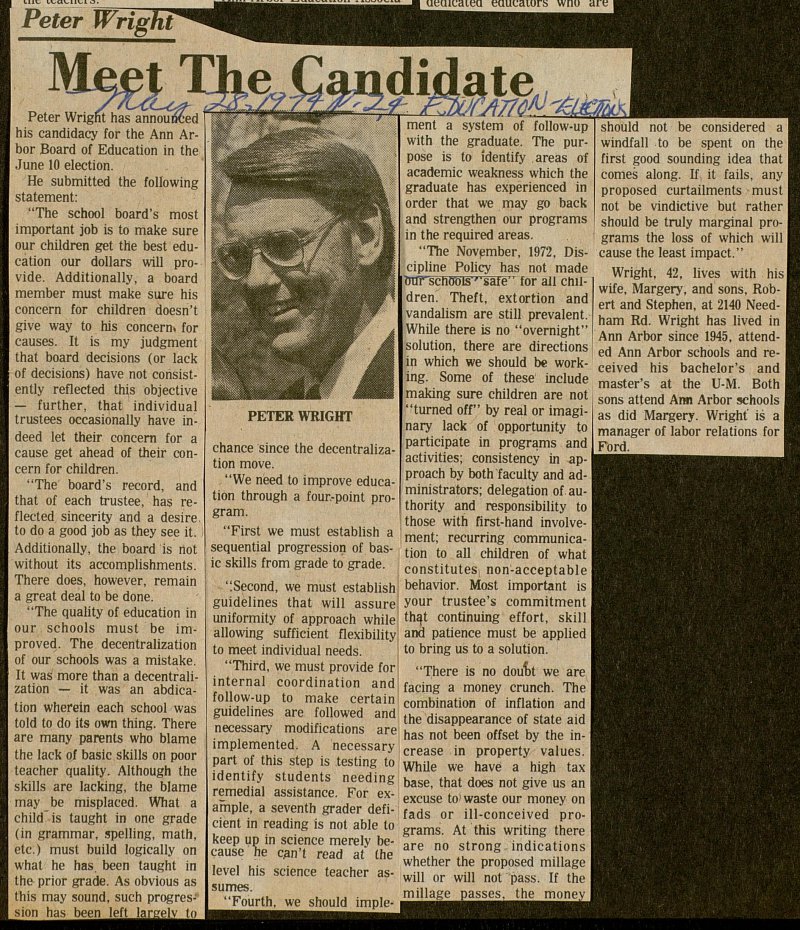Meet The Candidate

, Peter Wrigfft has annoulíced I his candidacy for the Ann Arbor Board of Education in the June 10 election. He submitted the following statement: "The school board's most important job is to make sure our children get the best education our dollars will provide. Additionally, a board member must make sure his concern for children doesn't give way to his concern for causes. It is my judgment that board decisions (or lack i of decisions) have not consistently reflected this öbjective - further, that individual trustees occasionally have indeed let their concern for a cause get ahead of their concern for children. "The board's record, and that of each trustee, has reflected sincerity and a desire, to do a good job as they see it. Additionally, the board is not without its accomplishments. There does, however, remain a great deal to be done. "The quality of education in our schools must be improved. The decentralization of our schools was a mistake. I It was more than a decentralization - it was an abdication wherein each school was told to do its own thing. There are many parents who blame the lack of basic skills on poor teacher quality. Although the skills are lacking, the blame ■may be misplaced. What a child'is taught in one grade (in grammar, spelling, math, etc.) must build logically on what he has, been taught in the prior grade. As obvious as this may sound, such progres-" sion has been left largelv to chance since the decentralization move. "We need to improve edueation through a four.-point program. "First we must establish a sequential progression of basic skills from grade to grade. "Second, we must establish guidelines that will assure uniformity of approach while allowing sufficient flexibility to meet individual needs. "Third, we must provide for internal coordination and follow-up to make certain guidelines are followed and necessary modifications are implemented. A necessary part of this step is testing to identify students needing remedial assistance. For example, a seventh grader cient in reading is not able to keep up in science merely because he can't read at the level his science teacher assumes. "Fourth, we should ment a system of follow-up with the gradúate. The purpose is to ídentify áreas of academie weakness which the gradúate has experienced in order that we may go back and strengthen our programs in the required areas. "The November, 1972, Discipline Policy has not made our scncrois '"sare" for all children. Theft, extortion and vandalism are still prevalent. While there is no "overnight" solution, there are directions in which we should be working. Some of these include making sure children are not "turned off" by real or imaginary lack of opportunity to particípate in programs and aGtivities; consistency in approach by both faculty and 1 ministrators; delegation of. 1 thority and responsibility to I those with first-hand 1 ment; recurring 1 tion to all children of what I constitutes, nonLacceptablel behavior. Most important is I your trustee's commitment I that continuing effort, skill I and patience must be applied I to bring us to a solution. "There is no douDt we are I facing a money crunch. The I combination of inflation and I the disappearance of state aid I has not been offset by the 1 crease in property values. I While we have a high tax I base, that does not give us an I excuse to' waste our money on I fads or ill-conceived 1 grams. At this writing there I are no strongindications I whether the proposed millage I will or will not pass. If the I millage passes, the money I should not be considered a I windfall to be spent on the I first good sounding idea that I comes along. If . it fails, any I proposed curtailments must I not be vindictive but rather I should be truly marginal 1 grams the loss of which will I cause the least impact." Wright, 42, lives with hisl wife, Margery, and sons, I ert and Stephen, at 2140 I ham Rd. Wright has lived in I Ann Arbor since 1945, 1 ed Ann Arbor schools and 1 ceived his bachelor's and I master's at the U-M. Both I sons attend Ann Arbor schools I as did Margery. Wright is a I manager of labor relations for I Ford. ■mn-wm H
Article
Subjects
Education - Elections
Has Photo
Ann Arbor News
Old News
Peter Wright